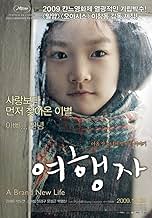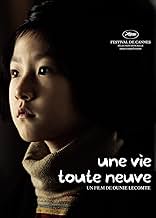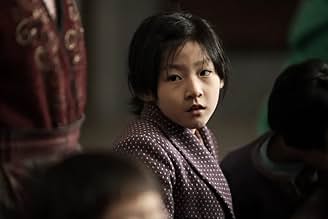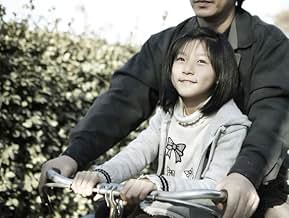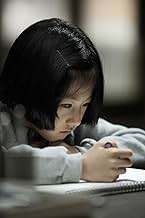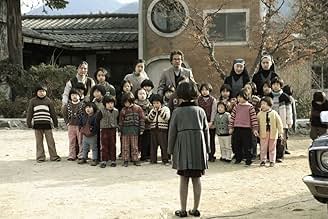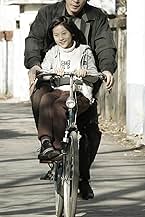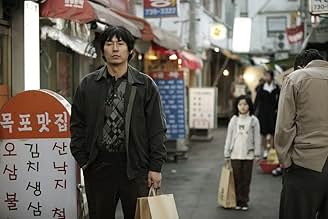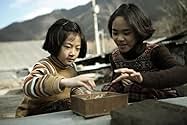Yeo-haeng-ja
- 2009
- 1h 32min
CALIFICACIÓN DE IMDb
7.4/10
2.7 k
TU CALIFICACIÓN
Agrega una trama en tu idiomaYoung Jinhee is taken by her father to an orphanage near Seoul. He leaves her there never to return, and she struggles to come to grips with her fate. Jinhee desperately believes her father ... Leer todoYoung Jinhee is taken by her father to an orphanage near Seoul. He leaves her there never to return, and she struggles to come to grips with her fate. Jinhee desperately believes her father will come back for her.Young Jinhee is taken by her father to an orphanage near Seoul. He leaves her there never to return, and she struggles to come to grips with her fate. Jinhee desperately believes her father will come back for her.
- Dirección
- Guionistas
- Elenco
- Premios
- 11 premios ganados y 2 nominaciones en total
Richard E. Wilson
- The American pupeteer
- (as Richard Wilson)
Opiniones destacadas
What kind of story would attract the acclaimed South Korean director Lee Chang-Dong's support and serving as a producer? (So far he has only served as a producer of two films. He was even only an executive producer of his own work "Secret Sunshine." I have to also mention that the film's French producer Laurent Lavolé was the guest who I honorably hosted in the Taipei Film Festival in 2008.) "A Brand New Life" is such a simple but moving film from the new French Korean filmmaker Ounie Lecomte. Based on her personal experience as a child, she sincerely shares this poignant but very inspiring childhood memories to the audience around the world.
Jinhee was taken out on a trip by her father. Her father bought a wide range of gifts, they ate lots of delicious food, and he even gave her a big cake, but it all turned to a different direction once they set their feet into a children's monastery shelter. It turned out that Jinhee's life will never be the same ever since. This has a similar premise as the famous fairy tale "The Little Princess" by the British writer Frances Hodgson Burnett. Though we think that there would be another harsh supervisor and several kids who try to bully her here through Jinhee's eyes, fortunately, the reality is not entirely so tragic.
The supervisor seems harsh, but in fact, she has a loving heart under her icy face; the crippled sister, who's the oldest among the children, sadly took her fate after the unsuccessful struggle; Sookhee is already an older child than most, she seems capricious at first, but she's very sympathetic underneath. She and Jinhee soon to become inseparable friends. But they still have total different perspectives toward the future. Sookhee, who has watched many of the adopted children left, wish that she would find a good home before she becomes too old, so she tried her best to promote herself once she gets the chance. But Jinhee, who's still waiting for her father to fulfill his promise and come back to pick her up, but the wait seems to be increasingly long and increasingly remote.
Lecomte showed her great talent in this film she wrote and directed for the first time. She presented the very personal story in a very modest and earthy way, but it's even more effective and moving than letting the sentiments taking over. Take the part where Jinhee and Sookhee secretly took care of a dying bird after they found it as an example, it simply conveys the profound meaning of the fine line between life and death. Kin Sae Ron, who was casted as Jinhee, successfully performed as the crucial key to make the film work, whether it's the look when being helpless, or the fake smile when she has learned to be sophisticated, they are all hard to make the audience not be moved.
After Sookhee was gone, Jinhee, who had hope once again in her heart, had lost someone she could rely on. In the meantime, she learned that her father and the family had moved to somewhere no one knows from the headmaster of the monastery. It was the first time in her life that she felt all alone and was left in helplessness and despair. but she eventually learned to face the difficulties of life with strengths. She quickly got a new hope that might become a turning point in her life with her adorable looks. When on her way towards the unknown destination, the warmth when leaning on her father's back on the back seat of the bike suddenly appeared in her heart, but it may only be deeply buried in the memory as the song she sang from her heart.
Jinhee was taken out on a trip by her father. Her father bought a wide range of gifts, they ate lots of delicious food, and he even gave her a big cake, but it all turned to a different direction once they set their feet into a children's monastery shelter. It turned out that Jinhee's life will never be the same ever since. This has a similar premise as the famous fairy tale "The Little Princess" by the British writer Frances Hodgson Burnett. Though we think that there would be another harsh supervisor and several kids who try to bully her here through Jinhee's eyes, fortunately, the reality is not entirely so tragic.
The supervisor seems harsh, but in fact, she has a loving heart under her icy face; the crippled sister, who's the oldest among the children, sadly took her fate after the unsuccessful struggle; Sookhee is already an older child than most, she seems capricious at first, but she's very sympathetic underneath. She and Jinhee soon to become inseparable friends. But they still have total different perspectives toward the future. Sookhee, who has watched many of the adopted children left, wish that she would find a good home before she becomes too old, so she tried her best to promote herself once she gets the chance. But Jinhee, who's still waiting for her father to fulfill his promise and come back to pick her up, but the wait seems to be increasingly long and increasingly remote.
Lecomte showed her great talent in this film she wrote and directed for the first time. She presented the very personal story in a very modest and earthy way, but it's even more effective and moving than letting the sentiments taking over. Take the part where Jinhee and Sookhee secretly took care of a dying bird after they found it as an example, it simply conveys the profound meaning of the fine line between life and death. Kin Sae Ron, who was casted as Jinhee, successfully performed as the crucial key to make the film work, whether it's the look when being helpless, or the fake smile when she has learned to be sophisticated, they are all hard to make the audience not be moved.
After Sookhee was gone, Jinhee, who had hope once again in her heart, had lost someone she could rely on. In the meantime, she learned that her father and the family had moved to somewhere no one knows from the headmaster of the monastery. It was the first time in her life that she felt all alone and was left in helplessness and despair. but she eventually learned to face the difficulties of life with strengths. She quickly got a new hope that might become a turning point in her life with her adorable looks. When on her way towards the unknown destination, the warmth when leaning on her father's back on the back seat of the bike suddenly appeared in her heart, but it may only be deeply buried in the memory as the song she sang from her heart.
Winner of the Best Asian Film Award at last year's Tokyo International Film Festival, and screened out of competition at Cannes this year, writer-director Ounie Lecomte's debut feature film is a semi-autobiographical tale of a young South Korean girl who got abandoned by her single dad to an orphanage where she yearns a life of normalcy, still harbouring hopes that she'll be reunited with the only family she knows.
One can imagine just how much reference from Lecomte's own life got written into the film. Being unable to speak Korean and has French as a first language herself, Lecomte's tale follows the adventures of Jinhee (Kim Sae Ron), a precocious little girl who ends up in France which probably accounted for the director's own language skills or the lack thereof in her native tongue, and throughout the story you'll find it pretty heart-wrenching especially when Jinhee tries to resist blending into the scheme of things in the orphanage, knowing that to go with the flow will mean to surrender all memory of her loved one and life as she knew, to making herself appealing for a new foster family to pick her up for adoption.
Thus beneath the exterior sweetness lies strong feelings of resentment and anger even, being unable to fathom how her dad can give her up so that she can supposedly lead a better life in a foster home in the mid 70s Korea, and likely one to be overseas given the kind of folks who drop by the orphanage to look for children to adopt. The story's episodic in nature as the orphanage serves as a temporary holding point in her life in between a giant leap of change, and flits between how Jinhee finds every opportunity to resist change, and how each time she embraces a little change through friendships forged, her heart gets broken all over again.
And having one's heart broken too many times probably doesn't bode well for a proper, balanced development, given that her trust with loved ones and friends got betrayed in the highest order. The gem and revelation of the film is the tour de force performance by Kim Sae Ron as Jinhee, who almost single-handedly lifts the film from start to finish giving an unbelievably strong performance for her age, dealing with the range of positive and negative emotions like a seasoned veteran.
You can't help but to fall in love with the little girl, and share in her despair at being abandoned, and weep a little with her when promises made become shattered. Casting Sae Ron is a stroke of brilliance, as the actress' performance was key to make or break this film, and thankfully, she was the miracle to breathe life into what was a straightforward story dealing with human emotions, nevermind the bleak landscape that spelt doom and gloom. This performance alone is well worth getting a ticket to the film.
One can imagine just how much reference from Lecomte's own life got written into the film. Being unable to speak Korean and has French as a first language herself, Lecomte's tale follows the adventures of Jinhee (Kim Sae Ron), a precocious little girl who ends up in France which probably accounted for the director's own language skills or the lack thereof in her native tongue, and throughout the story you'll find it pretty heart-wrenching especially when Jinhee tries to resist blending into the scheme of things in the orphanage, knowing that to go with the flow will mean to surrender all memory of her loved one and life as she knew, to making herself appealing for a new foster family to pick her up for adoption.
Thus beneath the exterior sweetness lies strong feelings of resentment and anger even, being unable to fathom how her dad can give her up so that she can supposedly lead a better life in a foster home in the mid 70s Korea, and likely one to be overseas given the kind of folks who drop by the orphanage to look for children to adopt. The story's episodic in nature as the orphanage serves as a temporary holding point in her life in between a giant leap of change, and flits between how Jinhee finds every opportunity to resist change, and how each time she embraces a little change through friendships forged, her heart gets broken all over again.
And having one's heart broken too many times probably doesn't bode well for a proper, balanced development, given that her trust with loved ones and friends got betrayed in the highest order. The gem and revelation of the film is the tour de force performance by Kim Sae Ron as Jinhee, who almost single-handedly lifts the film from start to finish giving an unbelievably strong performance for her age, dealing with the range of positive and negative emotions like a seasoned veteran.
You can't help but to fall in love with the little girl, and share in her despair at being abandoned, and weep a little with her when promises made become shattered. Casting Sae Ron is a stroke of brilliance, as the actress' performance was key to make or break this film, and thankfully, she was the miracle to breathe life into what was a straightforward story dealing with human emotions, nevermind the bleak landscape that spelt doom and gloom. This performance alone is well worth getting a ticket to the film.
...yet I was left wanting for more. I didn't get to know much about Jinhee, why she was there, what happened to her family, and the like. Yet in real life, as this movie was based on, we often don't get the answers we seek or that would make sense of our situation. One reviewer said it wasn't a tearjerker but a heart tugger, and I tend to agree. The roles were beautifully played the child cast and a few cameos were nice by two of Korea's leading male actors who played Jinhee's father and a sympathetic doctor.
The sad thing is, Koreans still dump unwanted children into orphanages to this day, a lot of whom are the product of out-of-wedlock relationships. It's horrible to have the children suffer for the mistakes of adults.
The sad thing is, Koreans still dump unwanted children into orphanages to this day, a lot of whom are the product of out-of-wedlock relationships. It's horrible to have the children suffer for the mistakes of adults.
When I sat down here in 2022 to watch the 2009 South Korean drama "Yeo-haeng-ja" (aka "A Brand New Life"), then I had never heard about the movie before. So writer and director Ounie Lecomte had every opportunity to bedazzle and entertain me.
While I have no idea what life in an orphanage would be like in the 1970s South Korean, then I will say that writer and director Ounie Lecomte definitely managed to put together a rather emotional and beautiful movie here with "Yeo-haeng-ja".
But it was not only the writing and the storyline that made "Yeo-haeng-ja" a good movie. No, it was also very much because of some really amazing acting performances, especially by Kim Sae-Ron, Do Yeon Park and Ko Asung.
It should be noted that "Yeo-haeng-ja" is a slow paced movie, even for a drama. So it is a movie that might not find a base with just anyone in the audience, as it requires a particular mindset and mood to delve into the movie and enjoy it. There is just a sense of realism and sadness about the movie that permeates the entire movie, and it does creep in under the skin.
I will say, though, that I was adequately entertained by "Yeo-haeng-ja". However, it is not a movie that I will ever return to watch a second time around, as the storyline just doesn't have the contents to support a second viewing.
My rating of "Yeo-haeng-ja" lands on a six out of ten stars.
While I have no idea what life in an orphanage would be like in the 1970s South Korean, then I will say that writer and director Ounie Lecomte definitely managed to put together a rather emotional and beautiful movie here with "Yeo-haeng-ja".
But it was not only the writing and the storyline that made "Yeo-haeng-ja" a good movie. No, it was also very much because of some really amazing acting performances, especially by Kim Sae-Ron, Do Yeon Park and Ko Asung.
It should be noted that "Yeo-haeng-ja" is a slow paced movie, even for a drama. So it is a movie that might not find a base with just anyone in the audience, as it requires a particular mindset and mood to delve into the movie and enjoy it. There is just a sense of realism and sadness about the movie that permeates the entire movie, and it does creep in under the skin.
I will say, though, that I was adequately entertained by "Yeo-haeng-ja". However, it is not a movie that I will ever return to watch a second time around, as the storyline just doesn't have the contents to support a second viewing.
My rating of "Yeo-haeng-ja" lands on a six out of ten stars.
"..Life in the orphanage, seen through the eyes of a child.."
A Brand New Life Story of a little girl, in a sudden, abandoned by her father in the orphanage.. Living her life in the orphanage and venturing herself to a great unknown, a new family, hence A Brand New Life..
The film is based on the experiences of the director, an ethnic Korean who was adopted by a French couple in the 1970s..
A beautifully made movie.. An 8 of 10 stars from me..
A Brand New Life Story of a little girl, in a sudden, abandoned by her father in the orphanage.. Living her life in the orphanage and venturing herself to a great unknown, a new family, hence A Brand New Life..
The film is based on the experiences of the director, an ethnic Korean who was adopted by a French couple in the 1970s..
A beautifully made movie.. An 8 of 10 stars from me..
Selecciones populares
Inicia sesión para calificar y agrega a la lista de videos para obtener recomendaciones personalizadas
- How long is A Brand New Life?Con tecnología de Alexa
Detalles
Taquilla
- Total a nivel mundial
- USD 169,277
Contribuir a esta página
Sugiere una edición o agrega el contenido que falta

Principales brechas de datos
By what name was Yeo-haeng-ja (2009) officially released in India in English?
Responda
